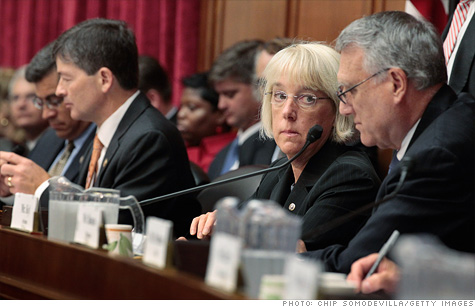Search News

Sen. Patty Murray, the debt committee co-chair, and her fellow panel members know very well that their mission is far greater than just proposing ways to reduce U.S. deficits.
NEW YORK (CNNMoney) -- As if finding consensus on debt reduction in a hyper-partisan environment isn't hard enough.
The other mission of the congressional debt committee is to prove to the world -- and credit ratings agencies -- that Congress isn't completely dysfunctional.
"The public is watching very closely to see if we can show this country that this democracy can work. I carry that weight on my shoulders as does every member of this committee," Sen. Patty Murray, the bipartisan committee's Democratic co-chair, told CNN last week.
That's a lot of pressure for the 12 lawmakers who have until Nov. 23 to demonstrate they can reach across the aisle.
If a simple majority fails to approve at least $1.2 trillion in debt reduction -- or Congress votes down the group's proposals in December -- that could put serious downward pressure on the U.S. sovereign credit rating.
The three major credit ratings agencies, which declined to comment for this article, basically put Congress on notice after the debt-ceiling nightmare this summer.
Standard & Poor's took the hardest line by replacing the United States' top-notch AAA rating with the lesser AA+ largely because of lawmakers' willingness to risk default to extract concessions on budget cuts.
S&P's action was, in essence, a political downgrade.
Looking ahead, S&P said it could downgrade the country again if Congress fails to implement at least $1.2 trillion in deficit reduction on top of the initial round of cuts called for by the debt-ceiling deal.
If the super committee process fails, in theory, $1.2 trillion in automatic spending cuts would be triggered. But many seasoned observers expect Congress may end up modifying or repealing that trigger.
By contrast, if the super committee process succeeds and Congress votes through more than the minimum $1.2 trillion in savings, S&P said that could help to stabilize the country's long-term AA+ rating.
Moody's, for its part, affirmed the country's AAA rating but revised the outlook to negative, and said if the super committee process proves "ineffective, this could affect the rating negatively."
And Fitch, which still maintains a stable outlook on its AAA rating for the United States, said failure by the committee to reach agreement on at least $1.2 trillion could hurt the rating.
And budget experts say even if the committee can lock arms on $1.2 trillion, it still matters how it gets there. Rather than just gunning for low-hanging fruit, lawmakers will impress markets and ratings agencies far more if they meaningfully address the drivers of the long-term debt -- entitlement spending and an insufficient revenue base to support it.
All three credit rating agencies, meanwhile, also noted that they would take into account whether economic growth prospects have worsened, which itself can increase U.S. debt. That's potentially ominous, since many economists now believe the risk of another recession has risen.
What the practical effects of another downgrade would be are anyone's guess. While conventional wisdom suggests such a move would increase the country's borrowing costs, in fact the 10-year Treasury rate began to fall immediately after S&P's rating action on Aug. 5, and today stands about 19% lower.
That's because investors still perceive the United States to be a safe haven relative to the rest of the world, in particular Europe, which is mired in its own debt crisis.
Stocks, meanwhile, got pummeled in the immediate aftermath of the downgrade. And they're still down. How much of a role the downgrade has played, though, isn't crystal clear.
It likely added to market volatility, but stocks are still hurting due to the uncertainty caused by Europe's situation more than anything else -- particularly its potential to harm U.S. banks and the broader economy.
Still, another downgrade when the market is unstable won't be a welcome event.
Of course, the committee could defy expectations and bolster market confidence, former Treasury Department official Roger Altman told the Senate Banking subcommittee.
"Expectations are awfully low right now. ... One of the advantages of actually achieving an agreement, especially if it were above the minimum, would be ... doubly beneficial because it would [confound] conventional wisdom."
| Overnight Avg Rate | Latest | Change | Last Week |
|---|---|---|---|
| 30 yr fixed | 3.80% | 3.88% | |
| 15 yr fixed | 3.20% | 3.23% | |
| 5/1 ARM | 3.84% | 3.88% | |
| 30 yr refi | 3.82% | 3.93% | |
| 15 yr refi | 3.20% | 3.23% |
Today's featured rates:
| Latest Report | Next Update |
|---|---|
| Home prices | Aug 28 |
| Consumer confidence | Aug 28 |
| GDP | Aug 29 |
| Manufacturing (ISM) | Sept 4 |
| Jobs | Sept 7 |
| Inflation (CPI) | Sept 14 |
| Retail sales | Sept 14 |